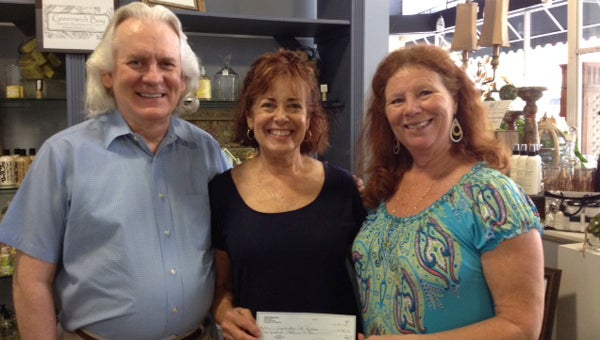Don’t be part of the problem
Published 6:57 pm Monday, June 8, 2015

REBECCA CLARK
PAMLICO PAWS: Little Shoppes and South Market Antiques Charity of the Month in April was Washington Cat Rescue. Rebecca Clark (right) and Jeffrey Phipps (left) were proud to present a check to director Leslie Steele. Washington Cat Rescue supports spaying and neutering and placement of cats to good homes. For information, contact Steele at 252-833-4347. Donations of books and money will be happily accepted Mondays through Saturdays from 11 a.m. until 6 p.m. The Charity Book Store is located at 127 W. Main St., Washington.
There’s not a whole lot cuter than the frisky ball of fluff that is a kitten. Those little bundles of energy are much fun to watch. But as cute as they are, they grow up — animal instincts kick in and next thing a cat owner knows, they’ve got a litter of kittens on their hands.
The importance of spaying or neutering pets cannot be stressed enough.
Here’s why: a single unsprayed female can have two litters of kittens a year. It’s safe to say that six of those kittens out of two litters will likely survive. So, in the first reproductive year of that cat’s life, she has 12 kittens. That’s not so bad — adding 12 kittens to the local cat population, hopefully with each one finding a good home.
But what happens when all 12 of those kittens, also unsprayed or unneutered, grow up and start reproducing? That’s when the odds of those kittens finding a home become increasingly low and the odds those cute little balls of fluff end up being euthanized in the local animal shelter become increasingly high.
In four years, a single unsprayed cat can ultimately be responsible for the births of over 2,000 kittens. In eight years, that number gets astronomical: over 2 million kittens.
Each day in the United States, over 70,000 puppies and kittens are born. Each year, more than 3.7 million animals are euthanized in shelters.
It is everyone’s responsibility as a pet owner to prevent his or her pet from contributing to this problem. Right now, the Betsy Bailey Nelson Animal Control Facility, also known as the Beaufort County shelter, is chock full of cats and kittens that need to be adopted. If they aren’t adopted, they will be euthanized.
No one wants to euthanize animals — not the Animal Control officers, not the many volunteers who donate countless hours to caring for the animals in the shelter, not any animal lover. But here, it’s unavoidable until people start taking more responsibility by getting their animals spayed or neutered. And for anyone who falls into another category of “pet owner” — those who feed and water strays without claiming them as pets — the responsibility to spay/neuter comes with those strays.
For those in the market for a cute little ball of fluff, the time to visit the shelter is now. For those who fundamentally oppose euthanasia of any animal, donate to the Humane Society of Beaufort County. The HSBC runs a program to get animals spayed/neutered at little to no cost.
For those who haven’t had their pets spayed or neutered: just do it. Don’t be part of the problem.
Through the month of June, the shelter is offering a reduced-rate adoption fee of $25 for cats and kittens. This fee includes spaying/neutering, the first round of shots, a microchip and worming for each cat or kitten adopted. For more information, call 252-946-1591.




